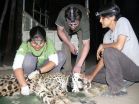Investigational drug reduces high potassium levels in chronic kidney disease patients
University of Maryland nephrologist leads multinational research effort
2014-11-21
(Press-News.org) Research published today found that the investigational drug patiromer decreased high potassium levels and maintained normal potassium levels in patients with chronic kidney disease. The results of a multicenter trial appear in the New England Journal of Medicine.
Elevated potassium, a condition called hyperkalemia, increases the risk of death in high-risk patients and limits the use of several types of drugs, called RAAS (renin-angiotensin-aldosterone system) inhibitors, commonly used to control hypertension and cardiovascular disease and prevent kidney disorders.
"Patients with advanced kidney disease are at highest risk for hyperkalemia thanks to a double whammy," says the study's principal investigator, Matthew R. Weir, MD, professor of medicine and director of the Division of Nephrology at the University of Maryland School of Medicine. "Their kidneys are unable to remove potassium from the body effectively, and the patient may also be taking certain blood pressure control drugs that have been linked to high potassium levels. Current medications for hyperkalemia have gastrointestinal side effects that limit their extended use. We hoped the drug in this study would do the job with minimal side effects."
In this Phase 3 study of 237 patients with chronic kidney disease who were receiving RAAS inhibitors, 76 percent of the patients reached the target potassium level after four weeks on patiromer. Subsequently, 107 patients were randomly assigned to the drug or a placebo. The potassium level increase was greater in the placebo group than with patiromer, and elevated potassium recurred in 60 percent of the placebo group compared to 15 percent of the patiromer group through week eight. Mild-to-moderate constipation was the most common adverse event.
INFORMATION:
The study was funded by Relypsa, Inc., maker of patiromer.
ELSE PRESS RELEASES FROM THIS DATE:
2014-11-21
The exclusive club of explorers who have discovered a rare new species of life isn't restricted to globetrotters traveling to remote locations like the Amazon rainforests, Madagascar or the woodlands of the Congo River basin. Just ask professor John Nelson and alumnus Douglas Rayner -- they're having their membership cards stamped with a long-hidden plant found nowhere but South Carolina.
The new species, dubbed Stachys caroliniana, makes its debut on the international botanical stage next week with a peer-reviewed publication describing its unique characteristics. It ...
2014-11-21
A study by a Wayne State University and Children's Hospital of Michigan, Detroit Medical Center research team is shedding new light on the troubling question of whether the drugs often given to HIV-positive pregnant women can cause significant long-term heart problems for the non-HIV-infected babies they carry.
The study recently published in the journal AIDS shows that while the HIV medications have been successful in helping to prevent the transmission of the virus from mother to infant, they are associated with persistently impaired development of heart muscle and ...
2014-11-21
An intervention that uses music and games to help preschoolers learn self-regulation skills is helping prepare at-risk children for kindergarten, a new study from Oregon State University shows.
Self-regulation skills - the skills that help children pay attention, follow directions, stay on task and persist through difficulty - are critical to a child's success in kindergarten and beyond, said OSU's Megan McClelland, a nationally recognized expert in child development and a co-author of the new study.
"Most children do just fine in the transition to kindergarten, but ...
2014-11-21
We are all familiar with the hassles that accompany air travel. We shuffle through long lines, remove our shoes, and carry liquids in regulation-sized tubes. And even after all the effort, we still wonder if these procedures are making us any safer. Now a new type of security detection that uses terahertz radiation is looking to prove its promise. Able to detect explosives, chemical agents, and dangerous biological substances from safe distances, devices using terahertz waves could make public spaces more secure than ever.
But current terahertz sources are large, multi-component ...
2014-11-21
You're at a slumber party with your friends. One friend asks "if a guy at school asked you out, but you weren't really attracted to him, would you go?" You laugh and shake your head no: "Why would I, if he's not my type?"
Or imagine you're at school, sitting in the cafeteria. A guy who you think is attractive but who has some unsuitable personality traits comes up and asks you out. You say yes, even though what you really meant to say was no. "Why did I do that?" you wonder.
According to new research from the University of Toronto and Yale University, rejecting unsuitable ...
2014-11-21
As an actress, producer, director and theatre arts lecturer at The University of Texas at Arlington, Julienne Greer knows the techniques that help draw people's deepest emotions to the surface. Now, she's building on her experience and research to help scientists and robotics engineers better understand the human experience so that they can build more responsive robots.
Greer, who holds a master's degree in media arts and a doctorate in humanities, recently authored the paper, "Building emotional authenticity between humans and robots." In it, she referenced a robot named ...
2014-11-21
OAKLAND, Calif., Nov. 21, 2014 -- Digoxin, a drug commonly used to treat heart conditions, was associated with a 71 percent higher risk of death and a 63 percent higher risk of hospitalization among adults with diagnosed atrial fibrillation and no evidence of heart failure, according to a Kaiser Permanente study that appears in the current online issue of Circulation: Arrhythmia and Electrophysiology.
Digoxin is a drug derived from digitalis, which has been used for more than a century for heart-rate control in patients with atrial fibrillation, and it remains commonly ...
2014-11-21
Patients who receive more cells get significant benefits. That's a key lesson emerging from a clinical trial that was reported this week at the American Heart Association meeting in Chicago.
In this study, doctors treated heart attack patients with their own bone marrow cells, selected for their healing potential and then reinjected into the heart, in an effort to improve the heart's recovery.
In the PreSERVE-AMI phase II trial, physicians from 60 sites treated 161 patients, making the study one of the largest to assess cell therapy for heart attacks in the United States. ...
2014-11-21
Scientists have identified four new genes associated with the severe food allergy eosinophilic esophagitis (EoE). Because the genes appear to have roles in other allergic diseases and in inflammation, the findings may point toward potential new treatments for EoE.
"This research adds to the evidence that genetic factors play key roles in EoE, and broadens our knowledge of biological networks that may offer attractive targets for therapy," said study leader Hakon Hakonarson, M.D., Ph.D., director of the Center for Applied Genomics at The Children's Hospital of Philadelphia ...
2014-11-21
Study says leopards stay surprisingly close to homes
Leopard home range around humans can be comparable to world's best protected areas
Article available from PLOS ONE
NEW YORK (November 21, 2014) - In the first-ever GPS-based study of leopards in India, led by WCS and partners has delved into the secret lives of these big cats, and recorded their strategies to thrive in human-dominated areas.
The study concludes that leopards in human areas are not always 'stray' or 'conflict' animals but residents, potentially requiring policy makers to rethink India's leopard-management ...
LAST 30 PRESS RELEASES:
[Press-News.org] Investigational drug reduces high potassium levels in chronic kidney disease patients
University of Maryland nephrologist leads multinational research effort




